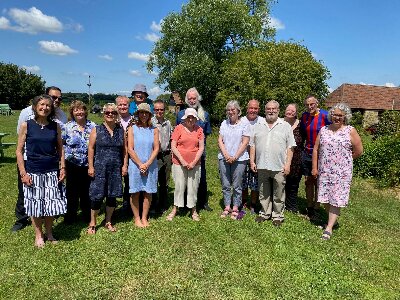Spiritual Volunteer YDH

NHS Healthcare Chaplaincy is responsible for providing and raising awareness of the availability of spiritual care within the Somerset NHS Foundation Trust to patients, carers, families, and its workforce. Individuals who are interested in the role of Spiritual Care Volunteer for Somerset Foundation Trust will be working closely aligned to the salaried chaplains, and therefore need to have a good understanding of this profession, remit and ethos.
Spiritual care is a broad concept that may include religious, cultural, and pastoral care. However, its concerns are exploring identity, meaning-making, well-being, wholeness, and resilience. NHS Healthcare chaplains support people by acknowledging the diversity of life experiences and their interpretations as individuals. Healthcare chaplains work alongside other healthcare professionals, volunteers, and local groups.
The Department of Health, the UK Board of Healthcare Chaplains, and the College of Healthcare Chaplains set the framework for NHS healthcare chaplaincy. NHS Healthcare chaplains are appointed by the NHS and, therefore, work to the ethos of the NHS and the values of Somerset NHS FT.
Healthcare chaplaincy requires practitioners to be competent in caring for people beyond their faith/belief group and/or personal belief and value systems. Chaplains are not expected to provide rituals or lead prayers outside their tradition, but are expected to be knowledgeable about other faith traditions. They will facilitate access to faith leaders or religious communities who can meet the patient or family's spiritual needs, always working with the patient's consent and maintaining patient confidentiality.
Are you interested in becoming a Spiritual Care Volunteer to support the chaplaincy in the manner outlined above?
Somerset NHS FT Pathway into NHS Healthcare Chaplaincy and becoming a Spiritual Care Volunteer:
- Informal conversation with NHS Healthcare Chaplain - senior member of the chaplaincy team
- Complete the online application form
- Invitation to join the training program, which will serve as a discerning process for both parties.
- Complete the requirements by the Trust to become a volunteer, including. DBS and reference checks
- Complete online mandatory training modules
- Independent working as a Spiritual Care Volunteer by providing spiritual care to patients, visitors and staff as directed by NHS Healthcare chaplains. Including assessing spiritual needs, providing spiritual and religious support where appropriate, liaising with team members and other staff members, and recording patient visits.
- Deepen own interests and develop expertise in a specific area, which may include community or mental health Chaplaincy
- Ongoing CPD: Monthly online meetings, monthly training opportunities, Away Days with the chaplaincy team
Part 1 – Initial Training
Session 1 – Friday 26 September 2025 9:30 – 12:00 – Venue TBA Topics: Introduction to spiritual care in a healthcare setting, Spiritual care, spiritual pain, healthcare chaplaincy, skills needed for the role.
Session 2 – Friday 03 October 2025 9:30 – 12:00 at Venue TBA Topic: Spiritual distress and loss of identity
Session 3 - Friday 10 October 2025 9:30 – 12:00 at Venue TBA Topic: Meaning making
Session 4 - Friday 17 October 2025 9:30 – 12:00 - Venue TBA Topics: Note writing, preparing for patient visits
Part 2
Theory and Personal Development We will then invite you to join one of our monthly personal development sessions where you will meet other staff and volunteers to discuss and explore a topic of the month. More details on these nearer the time.
**Practice - Shadowing and reviews ** For the following three months, you will then be invited to join our chaplains for 1 to 2 hours each week, for three weeks, as they visit patients. On the fourth week, we will meet to reflect on what you have learned and experienced and then look ahead to the next set of shadowing.
For the first month, you will work with one of our chaplains and listen in as they visit patients. For the second month, you will be invited to join in the conversation and participate in the visit alongside the chaplain, and for the final month, you will lead the visit with the chaplain there to support you.
This pattern ensures that you have enough practice, as well as time between shadowing stages to discuss your new role and for us to support you to move forward in the programme.